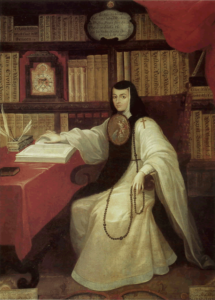‘The Sins of Sor Juana’ Play Explores Life of Famed Mexican Writer
December 7, 2020 Leave a Comment
In November, PBS Wisconsin and American Players Theatre (APT) continued its live play reading series “Out of the Woods” with three new plays.

Sor Juana Inés de la Cruz by Miguel Cabrera
These three plays – The Sins of Sor Juana, Nat Turner in Jerusalem and Smart People – were written by playwrights of color, and the readings included collaborations with artists and directors of color. They were livestreamed by APT and recorded by PBS Wisconsin on three Friday nights in November and are free to view online and on the free PBS App on your phone, tablet, other digital TV devices and smart TVs through Dec. 31.
The Sins of Sor Juana is a romantic and humorous play written by Karen Zacarías and inspired by the true story of famed writer Juana Inés de la Cruz, a woman determined to break the conventions of 17th-century Mexico.
Juana has long been revered in Mexico – her likeness has been displayed on currency as well as in museums and parks throughout the country – and she’s credited with mastering a wide range of poetic styles during the Spanish Golden Age.
The Sins of Sor Juana director and APT artistic associate Jake Penner said he tends to prep for directing a play by asking himself two questions – “What’s this play about?” and “What’s this play actually about?”
On the one hand, Penner said, “The Sins of Sor Juana is about a real-life 17th-century Mexican nun who takes up residence in a convent in order to continue publishing her writing, gets into trouble for doing so and then must figure out how to get back out of trouble while maintaining the life she’s created for herself.”
The second question, though, doesn’t often have a simple answer.
“It tends to traffic in the abstract,” Penner said. “What evergreen aspect of human nature is illuminated by this play, and how is our understanding deepened as a result? As I got to know this play, I was struck by how often Juana was forced to compromise. ‘You’re allowed to be a public intellectual, Juana, but only so long as you get married. You’re allowed to get married, Juana, but only so long as it’s not the man you actually love. You’re allowed to reside — and write — here in the convent, Juana, so long as your writing doesn’t contradict the church.’”
“But those compromises compound,” he continued. “They build on each other until Juana is eventually faced with a compromise that, in fact, compromises who she is at a fundamental level. And because she is an artist, a conduit through which truth is given voice, risking compromise at that fundamental level risks compromising Juana’s vision of what the world can be. And that’s a compromise she, and I’d argue all persons of true integrity, cannot abide.”
In The Sins of Sor Juana, the compromises Juana was forced to make as a woman and an artist made her relationships increasingly tricky to navigate. Through the course of the story, Juana loves and is loved by many. But that love more often than not comes with strings attached.
“Juana’s climax becomes about wresting her autonomy back from those around her by refusing what’s being demanded of her,” Penner said. “And Juana Inés de la Cruz cements her place in history as a result.”
In order to do that, Juana had to come to terms with her work and her life, past and present. And in doing so, Zacarías created a sort of literary time machine.
“Without giving too much away, the trunk that Xóchitl drags onstage in the play’s opening moments serves as a portal to Juana’s past,” Penner said. “Now, whether that portal is literal or not — or as literal as you can expect any time travel mechanism to be in a play of the magical realism genre — is very much up for interpretation. But either way, the effect is more or less the same: Juana has locked key elements of her younger self away, and those elements are about to spill out into Juana’s conscious awareness once again, thereby affecting her present-day circumstances.”
 Passport
Passport





